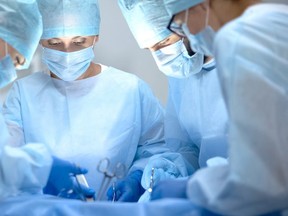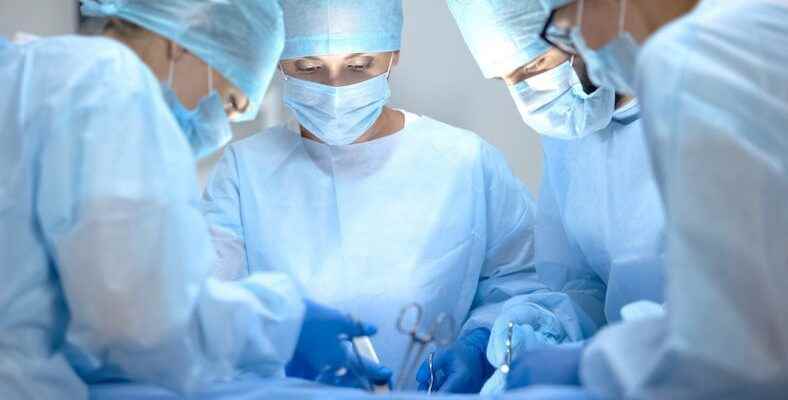
Nearly two years into the pandemic, London’s largest hospital is running a backlog of more than 7,000 surgical procedures that could take several years to whip, its chief medical officer says.
This advertisement has not loaded yet, but your article continues below.
The staggering figure was announced Monday, just as Ontario began reopening from a weeks-long lockdown and gave hospitals the green light to resume some non-urgent surgeries.
Those procedures were paused last month in a bid to protect hospital capacity amid soaring COVID-19 cases caused by the highly contagious Omicron variant.
Hospitals, including London Health Sciences Centre, have been on the front line of the fight against the virus while also dealing with urgent non-COVID patients. But wait times for other services postponed during the pandemic have been building.
On top of that many hospitals are fighting COVID-19 on another front during Omicron — illnesses among their own staff that can create daily juggling acts for care. Nearly 200 LHSC staff had the virus Monday.
“We will do our best to resume services as directed, but we’ll have to carefully balance resuming services with occupancy pressures and the availability of our precious health human resources,” Adam Dukelow, LHSC’s chief medical officer, said during a virtual news conference Monday.
Initial estimates pegged the time needed to clear the backlog at three to five years, but “that’s a very high-level estimate and it depends on the evolving (COVID-19) situation,” Dukelow said.
He said “putting a timeline” to tackling the backlog is “very challenging,” because the number of delayed procedures is growing and officials don’t know how COVID-19 will continue to affect the hospital’s capacity to deal with non-COVID cases.
This advertisement has not loaded yet, but your article continues below.
“We certainly hope that we won’t have another (COVID-19) wave in our future and that this current wave will dissipate relatively quickly, but we truly don’t know what to expect in the coming months,” Dukelow said.
LHSC’s COVID-19 patient caseload rose sharply last month after the Omicron variant took hold late last year.
Monday, LHSC reported it was caring for 155 patients with COVID-19, up 10 from Friday. Of the 155, 66 were in hospital for another ailment but had tested positive for the virus, while 26 patients were in intensive care.
There were also 197 LHSC staff diagnosed with the virus, up by eight from Friday’s figure, but far below the highest level, 512, recorded Jan. 12.
Dukelow told The Free Press last week that LHSC was making some headway in addressing the backlog caused by previous waves of the pandemic, “but that has now been stalled over the past three to four weeks with Omicron.”
The gynecology, orthopedics and general surgery departments have been among those with the largest declines in surgery volumes compared to pre-pandemic levels.
As of late last week, LHSC was operating at 40 per cent of its surgical volume and was working on adding more capacity, Dukelow had said.
But clearing the backlog would require “provincial support and solutions that go beyond well beyond the walls of LHSC,” he said Monday.
The president of the Ontario Medical Association, a group that represents doctors, says the pandemic has created a backlog of nearly 20 million health-care services in Ontario, based on provincial data from March 2020 to September 2021.
This advertisement has not loaded yet, but your article continues below.
Those services could include hip or knee replacements, cataract surgeries, colonoscopies, mammograms and mental health services, said Dr. Adam Kassam.
“It runs the gamut across our health system and, unfortunately, has been exacerbated as a result of the most recent wave of Omicron” and the province’s subsequent directive to halt non-urgent surgeries and diagnostic procedures, he said.
An estimated 8,000 to 10,000 procedures a week were affected in Ontario when the province put non-urgent surgeries on hold in early January. But amid indications the Omicron wave is cresting, those procedures are allowed to resume in stages beginning this week, with pediatric, diagnostic services and cancer screenings included in the first phase.
On Monday, public health officials in London and Middlesex County reported 83 new COVID-19 cases and the area’s 300th death since the start of the pandemic. There were also 1,894 active infections, but limitations in tracking and tracing mean the number is likely much higher.
Alex Summers, the area’s acting medical officer of health, said the London region continues to see a “stabilization” and a gradual decrease in cases and hospitalizations.
But he also urged Londoners not to let their guard down, warning of possible COVID-19 case increases in the coming weeks as the first wave of businesses shuttered by public health restrictions — restaurants, gyms and other indoor recreation areas — reopened Monday to half- capacity.
Further easing of the restrictions will roll out in stages in February and March.
“It is absolutely critical that we continue to be vigilant,” said Summers, stressing the need for everything possible to minimize the spread of the virus: masking, staying home if feeling unwell, keeping social circles small and getting vaccinated.
It was a message echoed by Dukelow.
“We are currently not out of the woods at this point,” he said.
With files by Canadian Press
Twitter.com/JuhaatLFPress
